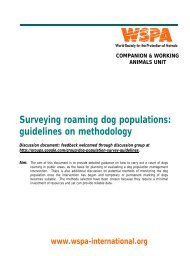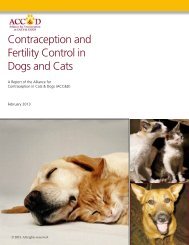download/print - Neighborhood Cats
download/print - Neighborhood Cats
download/print - Neighborhood Cats
- No tags were found...
Create successful ePaper yourself
Turn your PDF publications into a flip-book with our unique Google optimized e-Paper software.
In our experience, the primary cause of illness in ferals, including FIV and FeLV, hasmore to do with proper colony management than the presence of any virus. Colonieswith lots of sick cats are invariably ones that receive poor or insufficient nutrition, haveinadequate shelter from cold, rain, wind, snow, etc., and are unneutered and reproducing.These conditions lead to weakened immune systems and susceptibility to disease. Thebest way to prevent the spread of disease is not by testing and removing individual cats,but by improving the quality of food, making sure the cats have warm, dry shelter andgetting them sterilized.6. The life of a FIV or FeLV positive cat has value, tooAt <strong>Neighborhood</strong> <strong>Cats</strong>, we euthanize cats only if they are actively ill, suffering andterminal. We believe all lives, including positive cats, have value. If a feral cat was totest FIV or FeLV positive, but showed no signs of illness, we would return him to hiscolony. As a result, there’s no point in our testing as a matter of routine. We only test ifthe cat will be placed for adoption or is sick and the results are needed for diagnosis andtreatment, including determining whether euthanasia is appropriate.There have been a few instances when we knowingly returned FIV or FeLV positivebut asymptomatic cats back to their colonies. These colonies were neutered and wellmanaged. We have yet to observe other cats falling ill as a consequence. <strong>Cats</strong> who areknown to be positive do need to be closely observed for signs of the terminal stage of theillness, such as weight loss, persistent upper respiratory infections, drooling or difficultyeating. <strong>Cats</strong> exhibiting any of these signs should be re-trapped and examined by aveterinarian.If your veterinarian insists on testing, anyway….Despite these reasons for not testing every cat, some veterinarians and clinics mayinsist upon testing as a condition for using their services or giving you a discount rate. Ifthat’s the case, then find out before you bring in any cats what their policy is for treatingcats who do test positive. Most of the time, they will not follow up with a more definitivelaboratory test and will euthanize the cat based on the ELISA results alone. If this is thepolicy, we recommend you do not work with that particular veterinarian or clinic if youhave any other spay/neuter alternatives. As the caretaker of the colony, the one whowatches over, worries about and feeds the cats on a daily basis, it is your right to decidetheir fate. The veterinarian or clinic is there to help you care for the cats, not make lifeor-deathdecisions for you. Feral cats are not second-class animals and should receive thesame consideration as a pet. No veterinary professional would presume to decide for theguardian of a pet cat that the animal should be euthanized, nor should they do so for oneof your feral wards.124








